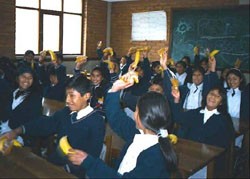
Bolivia’s public primary and secondary schools suffer from chronic underfunding, and a majority of pupils come from low-income families. For the poorest children, the food they receive while in school may be the only meal they receive that day and is important for academic performance as well as a source of nutrition in their diets. In 2001, USAID began introducing bananas into Bolivia’s school feeding program to provide affordable, high-quality and nutritious food to the school system.
At present, more than 584.000 students (roughly 47% of the country’s public school population) in 14,000 schools - from La Paz, Cochabamba, El Alto, Montero, Oruro and Potosi – are benefiting from the school feeding program. The program promotes better child health while supporting the objectives of alternative development – to create viable economic alternatives to coca in agriculture.
In 2003, Bolivia’s lunch packages included bananas and passion fruit. Every week, 100 metric tons of bananas and passion fruit were sold to companies contracted by municipalities to deliver the school feeding program. In turn, sales of bananas and passion fruit are increasing income of approximately 14,000 Chapare and Yungas farm families. By including alternative products such as banana and passion fruit in school feeding, USAID is not only supporting the improved nutrition of the students, but also increasing the income of thousands of farmers who are willing to permanently abandon coca production.







Comment
Make a general inquiry or suggest an improvement.